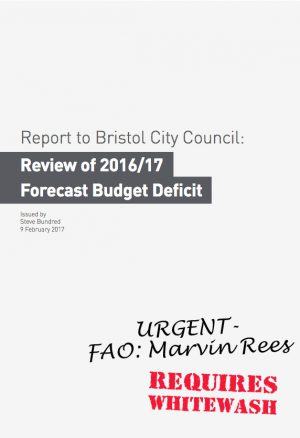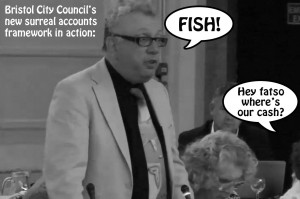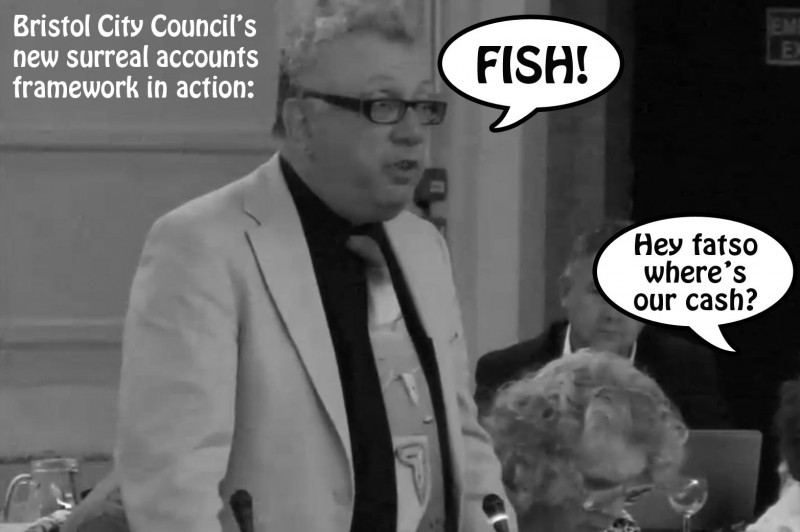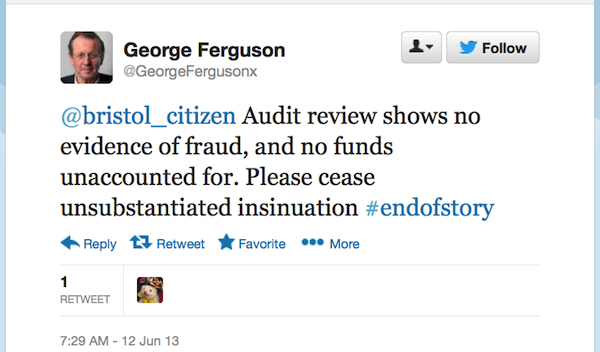
In an unprecedented move, Bristol’s co-operatively owned indie newspaper, The Bristol Cable, has REMOVED an entirely accurate article from its website following COMPLAINTS from the Reverend Rees and his bent coterie of very shy high-earning council bosses.
The article, published YESTERDAY, drew attention to a the council’s Draft Statement of Accounts, originally highlighted by the Bristol News Facebook page last week, that the Reverend’s council was employing more people on salaries exceeding £50k a year than they were a year ago.
The Reverend failed to comment to the Cable yesterday but did tell a Full Council meeting last night that the salary figures in his Statement of Accounts were INACCURATE and MISLEADING because they included the redundancy payments received by departing bosses.
This seems UNLIKELY since the Rev’s statement doesn’t list the gross salaries and benefits of his highly paid managers but the general ‘Remuneration Band’ they fall within. A ‘Remuneration Band’ would not ordinarily include one-off redundancy payments.
And if it did, why aren’t the twenty-one high-earning bosses – who shared out £2.5MILLION between them in redundancy pay-offs last year – listed and named in the report as earning over £150k last year as the law requires?
Regardless of these facts, the Cable has pulled the article and replaced it with the following statement: ***PLEASE NOTE THIS ARTICLE IS SUBJECT TO A COMPLAINT AND UNDER REVIEW***
Why has this article been pulled? It’s based on figures published in June by the council that were signed off by their Audit Committee on 27 June. If the figures are wrong, it’s the council’s job to explain this and publicly correct them. There is absolutely NO PRECEDENT or GOOD REASON for The Cable to pull a whole article published in good faith quoting publicly available official figures. Especially when these figures are yet to be formally denied anywhere as inaccurate.
It’s also laughable that The Rev Rees has put out a call across the city for “ideas” to deal with his budget deficit. However, when an “idea” involving not paying his bosses such large sums of money for sod-all appears, he tries to ban it!
If Bristol City Council wishes to attempt to censor information that makes the mayor look like a powerless twerp, then that’s their affair. But why are the Bristol Cable making fools of themselves by being bullied into supporting the council in their efforts to censor the truth?
The Cable article, obtained from the web’s cache is published below:
331 employees are now paid an annual basic pay of between £50,000 and £124,000, compared to 216 people in the financial year of 2015/16.
At the same time as general public sector pay caps and cuts has battered the council, almost every band of executive salaries at the council has seen an increase in numbers in the past year. Of the 21 senior pay categories that changed over the year, 18 have seen increases in the number of staff receiving top salaries.
These figures include the £160,000 a year council chief executive Anna Klonowski. It also includes at least three other executives who have seen their pay packets swell over the year by around £7,000 each, taking them to well above £160,000 a year including pension contributions.
Under pressure for implementing drastic cuts, Mayor Marvin Rees, who was elected in May 2016 has challenged anti-cuts protesters to come up with solutions, rather than just criticise. Defending the council positions on cuts, Mr Rees has written: “If we do not make a saving in one area we have to make it in another area. The consequence of one person’s priority is the de-prioritisation of another person’s priority.”
Responding to this latest information, Tom Whittaker a spokesperson from Bristol People’s Assembly, a coalition of trade unions and activists, said: “Clearly there can be no justification for executive pay rises when services are being cut, when many of Bristol’s poorest residents are struggling to survive under the impact of austerity and when ordinary council workers are enduring a long pay freeze.”
Mayor Rees was asked what involvement he had in these decisions, and how it fitted with his priorities agenda. He did not respond to the request.
The figures come from the 2016/17 unaudited annual accounts published by the council, available here.

 Bristol City Council’s Audit Committee continues to impress. The committee, that’s supposed to oversee sound finance and good governance at our council, releases its annual report to councillors today for the year the Bundred Report into the council’s latest FINANCIAL SHAMBLES was published.
Bristol City Council’s Audit Committee continues to impress. The committee, that’s supposed to oversee sound finance and good governance at our council, releases its annual report to councillors today for the year the Bundred Report into the council’s latest FINANCIAL SHAMBLES was published. More exciting news on the Rev Rees’s
More exciting news on the Rev Rees’s 




